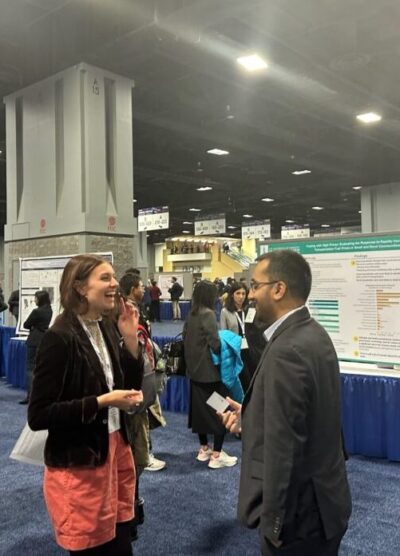May 2024
What’s Happening in the Transportation Research Center: Equity and Public Opinion of Mileage Fees with Clare Nelson
Written by Eliza Gebb, Program Outreach Intern
Of the many talented individuals that make up the University of Vermont’s Transportation Research Center, one of them is Clare Nelson, a Master’s Candidate in the University of Vermont’s civil and environmental engineering program and experienced researcher, who is currently exploring the mileage-based user fee, a potential way to tax vehicles by charging them for the number of miles they drive, its equity implications, and public opinion surrounding the mileage-based user fee and other options. Clare’s work is important today, especially when considering who can afford more fuel-efficient vehicles and thus purchase less gas and contribute less to the gas tax in this way. Thus far, Nelson has written three papers, one of which is published, and the other two amid the review process for publication. She is also currently working on two additional papers. Clare has presented her research to the Vermont Senate Committee on Transportation. She has also presented her work at the 2023 and 2024 Transportation Research Board meetings in Washington D.C., and the Air and Waste Management Association 2023 conference in Orlando, Florida.

Clare’s research arose from her undergraduate honors thesis, which she carried out with supervision from TRC Director Dr. Gregory Rowangould. The TRC has access to DMV registration and inspection data for every registered vehicle in Vermont going back to 2017, as well as the distance traveled each year. Relying on data from 2019, Clare assessed how all households would be financially impacted if the gas tax were replaced by either a revenue-neutral mileage fee or a revenue-neutral flat fee (not just EV owners). Clare also sent out a survey as a part of her thesis asking people how they felt about the different options available for how electric vehicles could contribute and exploring public support for the gas tax. This was a lot to undertake for an honors thesis and by the time she had wrapped up her undergraduate degree at the University of Vermont, there were still areas to explore and research opportunities. Clare decided to collaborate with Dr. Rowangould to pursue a Master’s degree and thus continue her research.
Since starting her master’s, Clare has collaborated with individuals at the Mineta Transportation Institute in San Jose, California to work on mileage fee studies. They have also done a national survey looking at how information can change policy opinions, which received over 2,000 responses. Clare states that one of her favorite aspects of the work is related to public perception of these policies. As she explains, “My favorite part is digging into human attitudes and behaviors and how those play into our decision-making. Historically, when individuals fill out public opinion polls, they have been assumed to be rational actors, meaning they are informed about the topic at hand and have considered the issue and developed an opinion. The reality is that people deal with a bounded rationality.” This concept refers to the fact that rationality is limited when individuals make decisions, and we will thus select satisfactory decisions instead of the optimal choice. According to the theory of bounded rationality, “we are not inclined to find all the necessary information to make a rational decision due to cognitive and temporal limitations. This restriction causes us to make choices that are merely satisfactory rather than continuing to search for the best option” (The Decision Lab, n.d.). The surveys that Clare helped work on and distribute considered this aspect of human rationality and tested how much opinions change when people are provided with information and given an opportunity to learn more.
Clare’s investigation into the mileage-based vehicle tax and its repercussions is connected to transportation equity and helping create a more equitable transportation system. Currently, our transportation system is organized in a way that places a greater economic burden on lower-income individuals, and there is evidence that lower households spend a greater share of their overall income on transportation costs, such as gas and vehicle maintenance. In addition, lower-income, people of color, and other marginalized communities bear the brunt of the negative externalities of our transportation systems, such as air pollution and the negative health effects that accompany it. These and other factors all relate to how individuals interact with and pay for the transportation systems around them. In her research, Clare Nelson found that a mileage-based fee would be better than a flat fee, where equity is concerned. As Clare explains, “Ultimately, we found that mileage fees would be less regressive than the gas tax. Generally, the evidence suggests it is less regressive and, on average there would be smaller cost increases for low-income and rural households.”
Clare is currently funded by the U.S. Department of Transportation University Transportation Center (UTC) grant from the National Center for Sustainable Transportation (NCST) at the University of California, Davis (UC Davis). UVM, UC Davis, CSU Long Beach, Texas Southern University, UC Riverside, USC, and Georgia Tech are all part of this UTC grant. Clare recently received an award for impactful work within the NCST grant. She also won a scholarship from the Vermont Chapter of the Women’s Society of Transportation. The year prior, she also received the Dwight D. Eisenhower Fellowship, a federal-level scholarship awarded by the U.S. Department of Transportation to individuals contributing to the transportation profession or with plans to enter the transportation world. For her proposal to the fellowship, Clare decided to focus on the potential of smart growth to affect travel behavior, essentially what the impact of taking actions such as densifying areas, increasing access to jobs and public transit, and more is on how far individuals are driving in cars and the resultant greenhouse gas emissions.

After finishing her Master’s in August 2024, Nelson plans to continue working for the Transportation Research Center while exploring job or PhD opportunities. As Nelson stated, “I’m not exactly sure where the path is going to take me right now, but I know that I’m incredibly passionate about science communication, bringing information back to the people, and looking at how both the public and politicians engage with information given the fact that we live in an incredibly overwhelming world.” Ultimately, Nelson is interested in continuing to explore how decisions are made, and how certain changes get on policy agendas and are moved forward. Clare is looking forward to exploring this area of study further, whether within the realm of transportation or in broader terms.
References:
“Bounded Rationality.” The Decision Lab, n.d. https://thedecisionlab.com/biases/bounded-rationality.
